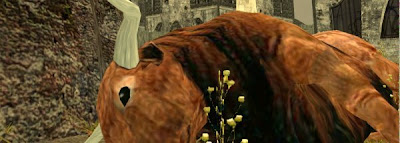At 7am:
The
morning of the fourth day has come.
Infected
in the past 24 hours: 53 ppl.
Died
in the past 24 hours: 51 ppl.
Gone
missing: 30 ppl.
Number
of dead at the moment: 204
Number
of infected: 58 ppl.
The
anxiety of the Powers is growing. Less than nine days remain.
I think I'm
making some mistakes.
I have to
confess: I feel jealous of the Haruspicus. I'm not jealous of his reputation,
or his inheritance, or his organ-stealing. It's mostly that his world seems a
bit more clear cut. There are mythological figures: a "Cult of
Bulls", a Hunchback and bulbous-headed worms who live in yurts out on the
steppe. Strange characters like the Butchers and Ospina trust him. He has to
deal with more visceral moral questions (like: do I kill this innocent person
walking down the street or not?). And in the end, I expect his conscience--and
Kevin's--will be tainted, permanently skewed.
I, on the other
hand, am stuck running errands for squabbling nobles. Rather than research, I
have to organize, rally and section off the town. I have to assure them that
they are all of one mind on how to combat this plague. I write letters to the
executors and townsfolk about how to stave off infection. And I feel
increasingly uncomfortable, because sooner or later either Olgimskiy or Saburov
or Kain will unwind my lies. Not huge lies--just enough to placate the three
families, to assure them of my authority. Until today, I haven't had to really
back up my words with any sort of force.
Sanitary Measures
 |
The Town
Map – infected areas are red, and the dead zone is black.
|
The sand plague
burned out in the Tanners District, and moved south. This isn't my primary
concern, however. The infection is spreading rapidly, and the town hall isn't
large enough to contain the bodies piling up. We need a hospital and a
mortuary. Lara Ravel, who relocated her ill-fated "House of the
Living" to her own private residence, has been forced to open up her home,
but the water supply has run dry. Apparently it was destroyed.
According to Fat
Vlad, two buildings have their own independent water supply: the Cathedral and
the Theatre. I'm sent to inspect both buildings and bring back their keys as
assurance. I go to the Rib district, overrun with plague, to find the Theatre
locked. A tragedian is cowering in the middle of infected district; I ask him
for the keys, and he asks me to lead him out.
Now I have to
relay an accidental discovery. I spent about an hour searching for the
tragedian in the ruins of a burnt house, to no success. Scattered in the grass
around the house, in the fetal position, were several men and women moaning. I
tried to talk to them and instead found a small menu open: a "Pain" bar,
and beneath it a list of all the medicines I owned. Selecting several bottles
of meradorm, a sedative, I successfully soothed their pain. With a sigh, they
relaxed and died.
 |
I feel
like I’m in Pan’s Labyrinth
|
I found I could
do this to multiple people and then take what I wanted from their corpses. The
loot did little to justify the procedure: medicine costs money, and they all
had very little money. So, stepping from one to another, I was faced with a
crisis. I wasn't sure how to find the tragedian, how he would appear, but I
assumed that since I had been led here I would need to do something with these poor, tortured people. Yet I didn't
have enough medicine, let alone money, to properly euthanize the whole lot.
That didn't
summon the tragedian, of course. I climbed to the top of the stairwell, looked
around, and saw him waiting patiently at a street corner just opposite the
broken house.
I collect the
keys, inspect both water sources at the Theatre and Cathedral, and return to
Olgimskiy with good news. He then tells me to choose which building will become
what. Will the theatre be a hospital or a mortuary? The thought of a cathedral
filled with corpses disgusts me, so I tell him the theatre will have to be the
mortuary. One of my adherents (the people I have to protect) is the theatre
director, and putting his space up as a morgue is perhaps unwise, but I'd
rather see the church filled with living people rather than the dead.
Rubber's Own
The guards have
begun to rebel. I don't know if it's a glitch of the game or otherwise, but
they've begun to randomly kill citizens in the streets. Alexander Saburov tells
me his men have begun to turn, too, and that Gryph, who sells bootlegged
weapons in the southern warehouse, is to blame. He offers me a handsome sum to
dispose of the gang. So, steeling myself, I head to finish off Gryph.
Gryph, of
course, doesn't want to die. He, in turn, offers me a large reward to kill
Braga and his men, who have hidden out in a smaller warehouse close by.
Thinking I might be able to play both sides, and get the reward money from
Gryph, and then later from Saburov, I play along and head to the warehouse.
My quest journal
says that this is, perhaps, the most decisive moment for me as a leader. That
this is my final chance to show my quality: killing 12 rippers in a locked
warehouse in close quarters.
 |
| Killing is fun! |
 |
|
Something
tells me Gryph would not put up much
of a fight.
|
 |
The shops
say the cows’ milk has been laced with ichor lately.
This
does nothing to help my appetite.
|






























